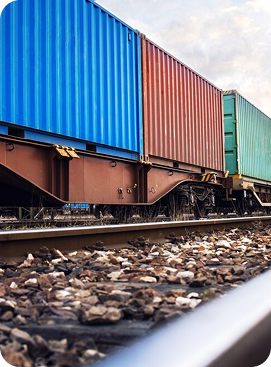Marine Cargo/Transit Insurance
Marine Cargo/Transit Insurance protects goods in transit across sea, air, and land, covering risks like theft, weather, and accidents.
- Protection Against Financial Loss
- Risk Management
- Flexibility in Coverage
What is Marine Cargo/Transit Insurance?
Marine Cargo/Transit Insurance is a specialized form of coverage designed to protect the value of goods in transit across various modes of transportation, including sea, air, and land. Unlike standard insurance policies that cater to static assets, Marine Cargo/Transit Insurance specifically addresses the dynamic risks associated with the movement of goods from one location to another, often crossing international borders.
Whether you are an importer, exporter, manufacturer, or logistics provider, Marine Cargo/Transit Insurance offers peace of mind by covering potential losses that could arise from unpredictable events such as rough weather, accidents, theft, or mishandling during transit.
In essence, Marine Cargo/Transit Insurance is not just about mitigating risks; it’s about ensuring the continuity of your business operations by safeguarding your shipments against the myriad of uncertainties that can occur during transportation.
How does Marine Cargo/Transit Insurance functions?
This process ensures that businesses are protected against financial losses during the transportation of goods, maintaining smooth operations even when challenges arise.

Importance of Marine Cargo/Transit Insurance
Protection Against Financial Loss:
Marine Cargo/Transit Insurance safeguards businesses from the financial impact of cargo loss or damage during transit, which can result from accidents, natural disasters, theft, or other unforeseen events.
Risk Management
By transferring the risk to an insurer, businesses can focus on their core operations without worrying about the potential losses associated with shipping goods. This is especially critical for high-value or time-sensitive shipments.
Compliance with Trade Requirements
Many international trade agreements and contracts require Marine Cargo/Transit Insurance as a standard practice, ensuring that all parties are protected in case of loss or damage during transit.
Ensures Business Continuity
In the event of a major loss, Marine Cargo/Transit Insurance provides compensation that can help a business recover quickly, minimizing disruptions and maintaining cash flow.
Enhances Credibility and Trust
Having Marine Cargo/Transit Insurance in place can enhance a company's credibility with clients and partners, as it demonstrates a commitment to protecting the value of the goods being transported.
Flexibility in Coverage
Marine Cargo/Transit Insurance policies can be tailored to meet the specific needs of a business, offering coverage for different types of goods, routes, and modes of transportation.

Importance of Marine Cargo/Transit Insurance
Protection Against Financial Loss:
Marine Cargo/Transit Insurance safeguards businesses from the financial impact of cargo loss or damage during transit, which can result from accidents, natural disasters, theft, or other unforeseen events.
Risk Management
By transferring the risk to an insurer, businesses can focus on their core operations without worrying about the potential losses associated with shipping goods. This is especially critical for high-value or time-sensitive shipments.
Compliance with Trade Requirements
Many international trade agreements and contracts require Marine Cargo/Transit Insurance as a standard practice, ensuring that all parties are protected in case of loss or damage during transit.
Ensures Business Continuity
In the event of a major loss, Marine Cargo/Transit Insurance provides compensation that can help a business recover quickly, minimizing disruptions and maintaining cash flow.
Enhances Credibility and Trust
Having Marine Cargo/Transit Insurance in place can enhance a company's credibility with clients and partners, as it demonstrates a commitment to protecting the value of the goods being transported.
Flexibility in Coverage
Marine Cargo/Transit Insurance policies can be tailored to meet the specific needs of a business, offering coverage for different types of goods, routes, and modes of transportation.
Advantages of Marine Cargo/Transit Insurance
Marine Cargo/Transit Insurance offers several key advantages for businesses involved in the transportation of goods:
Comprehensive Coverage
Protects against a wide range of risks, including damage, theft, loss, and delays during transit by sea, air, or land.
Financial Security
Ensures businesses are protected from significant financial losses due to unforeseen events, safeguarding profitability.
Global Reach
Applicable to both domestic and international shipments, providing coverage across borders throughout the entire journey.
Customized Policies
Allows businesses to tailor policies to their specific needs, including coverage levels, routes, and transportation modes.
Peace of Mind
Provides confidence, allowing businesses to focus on core activities without worrying about potential transportation losses.
Legal and Contractual Compliance
Meets requirements in shipping contracts and international trade agreements, ensuring legal compliance.
Claims Assistance
Offers support in the event of loss or damage, helping businesses recover quickly and efficiently.
Business Continuity
Maintains business operations by providing compensation that mitigates disruptions from lost or damaged goods.

Comprehensive Coverage
Protects against a wide range of risks, including damage, theft, loss, and delays during transit by sea, air, or land.
Financial Security
Ensures businesses are protected from significant financial losses due to unforeseen events, safeguarding profitability.
Global Reach
Applicable to both domestic and international shipments, providing coverage across borders throughout the entire journey.
Customized Policies
Allows businesses to tailor policies to their specific needs, including coverage levels, routes, and transportation modes.
Peace of Mind
Provides confidence, allowing businesses to focus on core activities without worrying about potential transportation losses.
Legal and Contractual Compliance
Meets requirements in shipping contracts and international trade agreements, ensuring legal compliance.
Claims Assistance
Offers support in the event of loss or damage, helping businesses recover quickly and efficiently.
Business Continuity
Maintains business operations by providing compensation that mitigates disruptions from lost or damaged goods.
Who needs Marine Cargo/Transit Insurance
Importers and Exporters
Businesses engaged in international trade need Marine Cargo/Transit Insurance to protect their goods during overseas transit, covering potential risks across borders.
Manufacturers
Companies that produce goods and ship them to distributors or customers, both domestically and internationally, require insurance to safeguard their products against damage or loss during transportation.
Logistics and Freight Forwarders
Companies responsible for organizing and handling the shipping of goods need Marine Cargo/Transit Insurance to ensure that their clients' goods are protected throughout the journey.
Retailers
Retailers that import products for sale often need Marine Cargo/Transit Insurance to cover the goods from the point of origin to their final destination, protecting their inventory and investment.
E-commerce Businesses
Online retailers who ship products globally or domestically benefit from Marine Cargo/Transit Insurance to protect against the risks associated with transporting goods to customers.
Wholesalers and Distributors
Businesses that purchase goods in bulk and distribute them to various locations need insurance to cover the transit risks involved in moving large quantities of products.
Project Owners and Contractors
Those involved in large-scale projects, such as construction or infrastructure development, often need Marine Cargo/Transit Insurance to cover the transportation of materials and equipment, ensuring their projects stay on schedule and within budget.
Individuals Shipping High-Value Items
Individuals shipping valuable personal items, such as artwork, antiques, or jewellery, can benefit from Marine Cargo/Transit Insurance to protect their belongings during transit.
Why should you buy Marine Cargo/Transit Insurance from GoInsureIndia.com?
Customized Coverage Just for You
At GoInsureIndia.com, we don’t believe in one-size-fits-all. Our Marine Cargo/Transit Insurance policies are tailored to fit your specific needs, whether you’re shipping by sea, air, or land. Get the protection that perfectly matches your business.
Expert Advice at Every Step
Navigating the complexities of Marine Cargo/Transit Insurance is easy with GoInsureIndia.com. Our seasoned experts are here to guide you through every step, from choosing the right policy to handling claims. You’re never alone when you have us by your side.
Dedicated Relationship Manager
Enjoy the VIP treatment with a dedicated relationship manager who knows your business inside and out. We provide personalized service to ensure your insurance needs are always met.
Hassle-Free Claims Support
In the unfortunate event of a loss, our dedicated claims team is on hand to make sure you’re taken care of quickly and efficiently. We streamline the claims process, so you can get back to business without the headaches.
Trusted by Industry Leaders
GoInsureIndia.com is a name you can trust. We’re known for our reliability, industry expertise, and commitment to customer satisfaction. With us, you’re in safe hands.

Why should you buy Marine Cargo/Transit Insurance from GoInsureIndia.com?
Customized Coverage Just for You
At GoInsureIndia.com, we don’t believe in one-size-fits-all. Our Marine Cargo/Transit Insurance policies are tailored to fit your specific needs, whether you’re shipping by sea, air, or land. Get the protection that perfectly matches your business.
Expert Advice at Every Step
Navigating the complexities of Marine Cargo/Transit Insurance is easy with GoInsureIndia.com. Our seasoned experts are here to guide you through every step, from choosing the right policy to handling claims. You’re never alone when you have us by your side.
Dedicated Relationship Manager
Enjoy the VIP treatment with a dedicated relationship manager who knows your business inside and out. We provide personalized service to ensure your insurance needs are always met.
Hassle-Free Claims Support
In the unfortunate event of a loss, our dedicated claims team is on hand to make sure you’re taken care of quickly and efficiently. We streamline the claims process, so you can get back to business without the headaches.
Trusted by Industry Leaders
GoInsureIndia.com is a name you can trust. We’re known for our reliability, industry expertise, and commitment to customer satisfaction. With us, you’re in safe hands.
Types of Marine Cargo/Transit Insurance
Also known as a single shipment or voyage policy, this type covers a specific consignment during a particular journey. It’s ideal for businesses that require coverage for a one-time shipment or irregular shipments, ensuring protection from the point of origin to the final destination.
This policy provides continuous coverage for all shipments within a specified period, usually a year. It’s perfect for businesses that regularly ship goods, as it automatically covers all shipments without needing to arrange insurance for each one individually.
Designed for businesses with frequent shipments, this policy offers coverage based on the total value of goods shipped over a year. It simplifies the insurance process by covering all shipments under one policy, offering both flexibility and comprehensive protection.

Difference between Marine Specific Transit, Marine Open Declaration & Marine Annual Sales Turn Over Insurance
| Feature | Marine Specific Voyage Insurance | Marine Open Declaration Policy | Marine Annual Sales Turnover Policy |
|---|---|---|---|
| Coverage Scope | Covers a single, specific voyage or transit. | Covers multiple shipments under a single policy up to a declared value. | Covers all shipments during the policy period based on annual turnover. |
| Policy Period | Valid only for the duration of a specific voyage. | Typically valid for one year, but only for declared shipments. | Typically valid for one year, covering all shipments within that period. |
| Flexibility | Limited flexibility; covers only the declared voyage. | Flexible; allows declaration of shipments as they occur. | Highly flexible; covers all shipments without the need for individual declarations. |
| Premium Payment | Single premium payment for the specific voyage. | Premiums are adjusted based on the value of shipments declared. | Premiums are calculated based on the estimated annual sales turnover. |
| Documentation | Requires individual policy issuance for each voyage. | Requires declarations for each shipment, usually on a monthly basis. | Minimal documentation; no need for individual shipment declarations. |
| Best Suited For | Businesses with infrequent or irregular shipments. | Businesses with regular shipments but varying volumes. | Businesses with high and consistent shipment volumes throughout the year. |

| Feature | Marine Specific Voyage Insurance | Marine Open Declaration Policy | Marine Annual Sales Turnover Policy |
|---|---|---|---|
| Coverage Scope | Covers a single, specific voyage or transit. | Covers multiple shipments under a single policy up to a declared value. | Covers all shipments during the policy period based on annual turnover. |
| Policy Period | Valid only for the duration of a specific voyage. | Typically valid for one year, but only for declared shipments. | Typically valid for one year, covering all shipments within that period. |
| Flexibility | Limited flexibility; covers only the declared voyage. | Flexible; allows declaration of shipments as they occur. | Highly flexible; covers all shipments without the need for individual declarations. |
| Premium Payment | Single premium payment for the specific voyage. | Premiums are adjusted based on the value of shipments declared. | Premiums are calculated based on the estimated annual sales turnover. |
| Documentation | Requires individual policy issuance for each voyage. | Requires declarations for each shipment, usually on a monthly basis. | Minimal documentation; no need for individual shipment declarations. |
| Best Suited For | Businesses with infrequent or irregular shipments. | Businesses with regular shipments but varying volumes. | Businesses with high and consistent shipment volumes throughout the year. |
| Risk Management | Limited to the specific voyage covered. | Provides continuous coverage but requires accurate declaration. | Comprehensive coverage for the entire year without the need for individual shipment oversight. |
| Cost Efficiency | Potentially higher cost per shipment due to individual policies. | Cost-effective for regular shippers with varying shipment sizes. | Cost-effective for businesses with consistent shipment volumes and values. |
| Claim Process | Claims are processed based on the specific policy for the voyage. | Claims are processed for declared shipments under the policy. | Claims are processed under the annual policy, covering all shipments. |
| Customization | Customizable for specific routes or cargo types. | Customizable for declared shipments but within the overall policy limits. | Less customization; covers all shipments under a broad policy framework. |
Types of Coverage under Marine Cargo/Transit Insurance
| Clauses | Coverage Type | Jurisdiction | Exclusions | Ideal For | Typical Perils Covered |
|---|---|---|---|---|---|
| ICC-A (International Cargo Clauses A) | All Risks | International Shipments | Inherent vice, delay, inadequate packaging | High-value goods requiring broad protection | All perils except those specifically excluded |
| ICC-B (International Cargo Clauses B) | Named Perils | International Shipments | Inherent vice, delay, inadequate packaging | Goods exposed to moderate risks | Fire, explosion, theft, earthquake, etc. |
| ICC-C (International Cargo Clauses C) | Basic Named Perils | International Shipments | Inherent vice, delay, inadequate packaging | Basic goods with minimal risk | Fire, explosion, vessel sinking, collision, etc. |
| ITC-A (Inland Transit Clauses A) | All Risks | Inland Transit | Inherent vice, delay, inadequate packaging | High-value goods during inland transit | All perils except those specifically excluded |
| ITC-B (Inland Transit Clauses B) | Named Perils | Inland Transit | Inherent vice, delay, inadequate packaging | Goods exposed to moderate risks during inland transit | Fire, explosion, theft, earthquake, etc. |
| ITC-C (Inland Transit Clauses C) | Basic Named Perils | Inland Transit | Inherent vice, delay, inadequate packaging | Basic goods with minimal risks during inland transit | Fire, explosion, overturning, collision, etc. |

| Clauses | Coverage Type | Jurisdiction | Exclusions | Ideal For | Typical Perils Covered |
|---|---|---|---|---|---|
| ICC-A (International Cargo Clauses A) | All Risks | International Shipments | Inherent vice, delay, inadequate packaging | High-value goods requiring broad protection | All perils except those specifically excluded |
| ICC-B (International Cargo Clauses B) | Named Perils | International Shipments | Inherent vice, delay, inadequate packaging | Goods exposed to moderate risks | Fire, explosion, theft, earthquake, etc. |
| ICC-C (International Cargo Clauses C) | Basic Named Perils | International Shipments | Inherent vice, delay, inadequate packaging | Basic goods with minimal risk | Fire, explosion, vessel sinking, collision, etc. |
| ITC-A (Inland Transit Clauses A) | All Risks | Inland Transit | Inherent vice, delay, inadequate packaging | High-value goods during inland transit | All perils except those specifically excluded |
| ITC-B (Inland Transit Clauses B) | Named Perils | Inland Transit | Inherent vice, delay, inadequate packaging | Goods exposed to moderate risks during inland transit | Fire, explosion, theft, earthquake, etc. |
| ITC-C (Inland Transit Clauses C) | Basic Named Perils | Inland Transit | Inherent vice, delay, inadequate packaging | Basic goods with minimal risks during inland transit | Fire, explosion, overturning, collision, etc. |
| Institute Cargo Clauses (Air) | All Risks | Air Transit | War, inherent vice, delay | High-value goods transported by air | All risks except those specifically excluded |
| Institute War Clauses (Cargo) | War Risks | International Shipments | General exclusions apply | Goods in war zones or high-risk areas | War, civil war, revolution, rebellion, etc. |
| Institute Strikes Clauses (Cargo) | Strikes, Riots, Civil Commotions | International Shipments | General exclusions apply | Goods in areas prone to strikes or civil unrest | Strikes, riots, civil commotions, etc. |
| Institute Theft, Pilferage, and Non-Delivery (TPND) Clauses | Theft, Pilferage, Non-Delivery | International and Domestic Shipments | General exclusions apply | High-value or easily marketable goods | Theft, pilferage, non-delivery |
| Institute Frozen Food Clauses (A) | All Risks for Frozen Food | Frozen Food Shipments | Inherent vice, temperature control failure (unless caused by insured peril) | Frozen food requiring maximum protection | All risks except those specifically excluded |
| Institute Frozen Food Clauses (B) | Named Perils for Frozen Food | Frozen Food Shipments | Inherent vice, temperature control failure | Frozen food with limited risk exposure | Fire, explosion, collision |
| Institute Container Clauses | All Risks for Containers | Containerized Cargo | General exclusions apply | Shipments using containers | All risks except those specifically excluded |
| Institute Cargo Clauses (Disbursements) | Disbursements | Cargo Disbursements | General exclusions apply | Shipments with significant disbursements | Disbursements due to insured risks |
Non-Institute Clause/Coverage
General Average
Coverage:
Ensures that all parties in a sea voyage share the loss if part of the cargo is sacrificed to save the vessel. This coverage compensates the insured for their share of the loss.
Ideal for:
Shipments exposed to significant maritime risks.
Pair and Set Clause
Coverage:
If one item in a pair or set is damaged, this clause provides compensation for the loss by considering the reduced value of the remaining items.
Ideal for:
Goods that are part of a matched pair or set, such as luxury items or machinery components.
Debris Removal Clause
Coverage:
Covers the costs associated with removing debris after an insured event, such as a shipwreck or cargo spill, ensuring that the insured is not burdened with these additional expenses.
Ideal for:
Shipments involving potentially hazardous or bulky cargo.
Concealed Damage Clause
Coverage:
Provides coverage for damage that is not immediately apparent upon delivery but is discovered later, typically within a specified period.
Ideal for:
Goods that may be susceptible to hidden damage, such as electronics or machinery.
Sue and Labor Clause
Coverage:
Requires the insured to take reasonable steps to prevent or minimize a loss, with the insurer reimbursing the costs of these actions. This coverage encourages proactive measures to protect the cargo.
Ideal for:
Shipments where the insured has the capacity to intervene in mitigating potential losses.
Institute Replacement Clause
Coverage:
Provides coverage for the cost of replacing damaged or lost items with new ones, rather than just compensating for the item’s depreciated value.
Ideal for:
High-value goods where replacement with new items is crucial, such as industrial equipment or high-end consumer goods.
Waiver of Subrogation Clause
Coverage:
Prevents the insurer from seeking reimbursement from third parties who may be responsible for the loss. This clause is often used to maintain business relationships between the insured and third parties.
Ideal for:
Shipments involving long-term partnerships or contracts where maintaining good relationships is key.
Accumulation Clause/200% Accumulation Clause
The Accumulation Clause allows insurance coverage to extend beyond standard limits if goods unexpectedly accumulate during transit due to factors like delays or accidents. The insurer’s liability can increase up to 200% of the original conveyance limit, provided the insured notifies the insurer promptly. This clause is designed to cover unforeseen buildups of goods, particularly at locations like transshipment ports, where the value of goods may exceed the expected limits.
Ideal For: High-value shipments where unforeseen accumulations could occur, particularly at transshipment ports or during delays.
Aircraft Clause
The Aircraft Clause ensures that terms like ‘ship,’ ‘vessel,’ and ‘seaworthiness’ in the policy also apply to air transport, using equivalents like ‘aircraft’ and ‘airworthiness.’ This clause is used when there is a need for restricted coverage for air transits, as there are no specific Institute clauses equivalent to ICC B and C for air travel. It ensures that the policy remains appropriate and avoids disputes about coverage.
Ideal For: Shipments that involve both sea and air transport, or goods transported entirely by air that need specific coverage.
Airfreight Replacement Clause
The Airfreight Replacement Clause covers the costs of airfreighting damaged goods or replacement parts for repair and returning them to the original destination, even if the original shipment was by sea. This clause, also known as the expediting expenses clause, is subject to a specified sub-limit and ensures timely repairs and replacements by covering the additional airfreight costs.
Ideal For: High-value goods requiring timely repairs or replacements, especially when the original shipment was by sea.
Brands Clause
The Brands Clause ensures that if branded or trademarked goods are damaged, the brands or trademarks must be removed before the goods are salvaged or sold. This protects the reputation of the brand or supplier. However, the clause can limit the insurer’s ability to reduce claim amounts through salvage sales, especially when the brand or trademark cannot be removed.
Ideal For: Luxury goods, electronics, or any branded products where maintaining brand reputation is crucial.
Concealed Damage Clause
The Concealed Damage Clause covers loss or damage discovered when containers or packages are opened after transit, assuming the damage occurred during the insured transit unless proven otherwise. This coverage applies if the damage is found within 30 days of the end of transit. The clause addresses the issue of hidden damage that can go unnoticed due to modern packing methods and containerization.
Ideal For: Luxury goods, electronics, or any branded products where maintaining brand reputation is crucial.
Container Clause
The Container Clause assumes that the container carrying the insured cargo is fit for use, unless the assured or their employees are aware of any unfitness. This clause is important because containers can have issues like holes or rust that may cause water damage during transit. While pre-shipment inspections are recommended, they can be challenging to conduct, especially for traders or when dealing with large volumes of goods.
Ideal For: High-volume shipments in containers, where container integrity is crucial to avoid water damage or other issues.
Container Demurrage Charges Clause
The Container Demurrage Charges Clause covers the costs of demurrage charges or late penalties that the assured incurs for the late return of containers. This coverage applies when the delay is due to the insurer instructing the assured to retain the container for inspection related to a claim. The clause ensures that the insured is reimbursed for these charges when the delay is caused by an insured peril during transit.
Ideal For: Shipments requiring detailed inspections post-arrival, particularly when containers cannot be promptly returned.
Cutting Clause
The Cutting Clause specifies that if a portion of a pipe, sheet, or tile is cracked or broken, the damaged part will be cut off, and the insurer will pay the proportionate value of the cut portion. Any salvage value is also considered. This clause is particularly relevant for items like pipes or steel where even minor damage can render the entire piece unusable. It’s important to use this clause carefully, especially in projects where specific dimensions are critical.
Ideal For: Shipments of pipes, steel, or other materials where even minor damage can render the entire piece unusable.
Debris Removal Clause
The Debris Removal Clause extends coverage to include the extra expenses incurred by the assured for removing and disposing of debris from the insured cargo if damaged by an insured risk. However, it excludes costs related to pollution, contamination, or removing cargo from a vessel. The insurer’s liability under this clause is typically capped at 10% of the insured cargo’s value.
Ideal For: Shipments of hazardous or bulky cargo, where debris removal could be costly.
Deck Cargo Clause
The Deck Cargo Clause covers insured goods carried in containers on deck in the same way as under-deck cargo, unless otherwise agreed. For other deck cargo, coverage is typically limited to Institute Cargo Clauses (C), including risks like jettison or washing overboard. It’s crucial to inform the insurer if cargo will be stowed on deck, as coverage for deck cargo is generally more limited unless specifically extended, often with additional premiums and survey requirements.
Ideal For: Oversized or heavy goods that must be stowed on deck due to their size or weight.
Deductible Clause
The Deductible Clause specifies that while deductibles are generally applied to eliminate smaller claims, they will not be applied to claims covered under Institute Cargo Clauses (C), war, strikes, General Average, Salvage, or Sue and Labour Charges. This ensures that the assured is not penalized with a deductible for claims arising from major perils or unforeseen events that are beyond their control.
Ideal For: Policies where major perils or unforeseen events are covered, ensuring that deductibles do not reduce the claim payout for significant losses.
Difference in Conditions Clause
The Difference in Conditions (DIC) Clause provides additional coverage when goods are purchased CIF or on similar terms, and the insurance arranged by the seller offers less protection than the buyer’s policy. This clause ensures that the buyer is covered for the difference in coverage, matching the conditions of their own insurance. It also guarantees the collection of all losses that would be covered under the buyer’s policy, with the insurer advancing the claim amount as a repayable loan. This clause ensures that the buyer is fully protected without creating double insurance.
Ideal For: Buyers purchasing goods CIF or on similar terms, who want to ensure their insurance coverage matches their needs.
Errors and Omissions Clause
The Errors and Omissions Clause ensures that the assured is not penalized for unintentional delays, omissions, or errors in reporting, or inaccuracies in the description of the insured interest, vessel, or voyage. As long as the insurer is notified as soon as the errors are discovered and any premium deficiencies are corrected, coverage remains intact. While this clause is beneficial, it doesn’t protect against all defenses an insurer might raise, such as non-compliance with classification clauses.
Ideal For: Shipments where there is a risk of errors in reporting or description, particularly in complex logistics scenarios.
FOB and FAS Purchases Clause
The FOB and FAS Purchases Clause provides insurance coverage from the moment goods leave the supplier’s premises, even if they are purchased on FOB (Free on Board) or FAS (Free Alongside Ship) terms. This means the insurer assumes risk from the time the goods depart the supplier’s factory or warehouse, regardless of the terms of the sale. The clause allows the assured to subrogate their rights against the supplier for any damage occurring before the goods are officially delivered under FOB or FAS terms. This acts as a contingency cover, ensuring that the buyer is protected even if damage occurs before the buyer has full insurable interest.
Ideal For: Buyers purchasing goods FOB or FAS, ensuring that their goods are covered from the point of departure.
General Average in Full Clause
The General Average in Full Clause ensures that for claims involving General Average (GA) contributions and salvage charges, the insured goods are considered to be insured for their full contributory value. This prevents issues of under-insurance if the goods’ value at discharge exceeds the sum insured, which can happen due to factors like currency fluctuations.
Ideal For: High-value shipments where the full contributory value needs to be protected in General Average situations.
Letter of Credit Clause
The Letter of Credit Clause ensures that the insurance coverage meets the specific requirements outlined in a Letter of Credit (LC). This clause allows the insured to comply with the bank’s instructions, provided they don’t exceed the existing provisions of the insurance contract. Even if the LC requires specific terms or clauses, the insurer ensures that the assured’s interests are fully protected under the broader terms of the original policy. This flexibility accommodates bank requests, such as the use of American Institute Cargo Clauses, while maintaining the intended coverage scope.
Ideal For: Shipments financed through Letters of Credit, where specific insurance terms must be met to satisfy the bank.
Loading and Unloading Clause
The Loading and Unloading Clause extends coverage to include loss or damage to goods during the loading onto and unloading from the carrying conveyance, as well as during the stuffing and destuffing of containers. This protection applies immediately before dispatch and immediately after arrival at the assured’s or consignee’s premises. While the ICC 2009 edition already covers these risks, this non-Institute clause is often added when the policy is based on the older ICC 1982.
Ideal For: Shipments involving complex logistics, where goods are at risk during handling operations.
Packers Clause
The Packers Clause extends coverage to include goods in transit to a packer’s premises, while being packed, and awaiting shipment for a specified number of days. It also covers the transit from the packer’s premises to the final destination. This clause is important because standard warehouse-to-warehouse coverage under Institute Cargo Clauses does not typically include these transits, which are not considered part of the “ordinary course of transit.” Ensuring coverage during these stages is recommended, especially when professional packers are involved.
Ideal For: Shipments requiring professional packing, particularly when warehouse-to-warehouse coverage does not typically include these stages.
Presentation Packing Clause
The Presentation Packing Clause ensures that the insurer will cover the reasonable costs of repairing or replacing the presentation packing of goods if it is lost or damaged during transit, provided the packing was adequately protected against normal transit conditions. This clause is particularly important when the packing is an intrinsic part of the product, such as in the case of perfumes in bottles, where the packing itself is considered part of the insured goods. Typically, insurers do not cover packing damage, but this clause makes an exception when packing is essential to the product.
Ideal For: Goods where the presentation packing is an intrinsic part of the product, such as perfumes or luxury items.
Repacking Clause
The Repacking Clause covers the cost of reasonable repacking expenses if the original packing is damaged during transit, making the goods unfit for onward shipment or distribution. This coverage applies only if the damage occurred due to an insured peril during the insurance period. However, if the goods reach their final destination without damage, repacking costs are not covered.
Ideal For: Goods intended for onward sale, where damaged packing could prevent further distribution.
Seals Clause
The Seals Clause ensures that claims for theft, pilferage, or non-delivery of a whole package will be honored even if the container’s seals appear intact. Such claims will be settled in full upon the production of loading and discharge tally sheets. This clause is particularly.
Ideal For: Goods intended for onward sale, where damaged packing could prevent further distribution.
Duty of Assured Clause
- Coverage: Outlines the responsibilities of the assured to minimize loss, including taking reasonable steps to protect the cargo from further damage after an incident. The insurer may not pay for losses exacerbated by the assured’s negligence.
- Ideal For: All shipments, as it enforces the principle that the assured must take steps to mitigate loss.
Fumigation Clause
- Coverage: This clause covers the costs associated with the fumigation of goods, especially when infestation is discovered during transit or upon arrival. It ensures that the cargo is treated and made safe without the assured bearing the full cost.
- Ideal For: Agricultural products, foodstuffs, or other goods susceptible to infestation.
Held Covered Clause
- Coverage: If the insured inadvertently fails to report a change in the risk that would typically alter the insurance terms, the clause allows the coverage to continue, provided the assured informs the insurer as soon as possible and pays any additional premium.
- Ideal For: Cargo shipments where the nature of the goods or the voyage details may change after the insurance is arranged.
Increased Value Clause
- Coverage: Allows for additional insurance to be taken out if the value of the goods increases after the policy is issued. It ensures that the full, updated value of the goods is covered.
- Ideal For: Goods that may appreciate in value during transit or require increased coverage due to changes in market conditions.
Machinery Clause
- Coverage: Provides specific coverage for machinery items, ensuring that coverage applies even if the machinery is partially damaged. Often includes specific conditions about the extent of coverage, especially regarding repair costs.
- Ideal For: Shipments of heavy machinery or industrial equipment.
On Deck Clause
- Coverage: Specifies the conditions under which cargo stowed on deck is covered. Typically includes coverage for risks like washing overboard, but often with limitations compared to below-deck cargo.
- Ideal For: Cargo that must be stowed on deck due to size, weight, or other considerations.
Pollution Hazard Clause
- Coverage: Provides coverage for liability arising from pollution caused by the insured cargo, including the cost of cleaning up spills and legal expenses. It’s especially relevant for hazardous materials.
- Ideal For: Shipments of chemicals, oil, or other hazardous materials that pose a significant pollution risk.
Unseaworthiness and Unfitness Exclusion Clause
- Coverage: Excludes coverage if the loss arises from the unseaworthiness of the vessel or the unfitness of the transport method, unless the assured can prove they were unaware of the condition.
- Ideal For: Situations where there’s a concern that older or less reliable vessels or transport methods may be used.
Common Exclusions under Marine Cargo/Transit Insurance
Willful Misconduct
No coverage for losses due to intentional acts or negligence by the insured.
Inherent Vice
Excludes damage due to the natural characteristics of the goods, such as spoilage or corrosion.
Ordinary Leakage and Weight Loss
Normal shrinkage, evaporation, or loss in weight during transit is not covered.
Insufficient Packing
Damages due to inadequate or improper packing are excluded.
Delay
Losses solely caused by delays in transit are not covered.

Common Exclusions under Marine Cargo/Transit Insurance
Willful Misconduct
No coverage for losses due to intentional acts or negligence by the insured.
Inherent Vice
Excludes damage due to the natural characteristics of the goods, such as spoilage or corrosion.
Ordinary Leakage and Weight Loss
Normal shrinkage, evaporation, or loss in weight during transit is not covered.
Insufficient Packing
Damages due to inadequate or improper packing are excluded.
Delay
Losses solely caused by delays in transit are not covered.
War and Strikes
Excludes damages from war, strikes, riots, and civil commotions, unless separately insured.
Nuclear Contamination
No coverage for damages from nuclear reactions or radioactive contamination.
Unseaworthiness
Losses due to unfit vessels or transport, if known by the insured, are excluded.
Loss of Market
Financial losses from market fluctuations or missed opportunities are not covered.
Temperature Variations
Damage from temperature or humidity changes is excluded unless specifically covered.
Customs Rejection
Losses due to goods being rejected or confiscated by customs authorities are not covered.
Insolvency of Carrier
Excludes losses if the carrier becomes insolvent and cannot complete the delivery.
Wear and Tear
Ordinary wear and tear of goods during transit is not covered.
Pollution Damage
Excludes damages due to pollution, unless caused by a covered peril.
Pre-existing Damage
Damage that existed before the start of the transit is not covered.
Common Conditions/Warranties under Marine Cargo/Transit Insurance

Notice Timeline to Carrier by Mode of Transit
- Relevant Section: Section 106 (Indian Railways Act)
- Notice Period: Within 6 months from the date of booking. For non-delivery claims, notice should be lodged within 90 days from the date of dispatch.
- Addressing the Notice: Notice should be sent in writing to the General Manager or Chief Commercial Superintendent of the concerned Railway Administration via Registered Post A/D.
- Relevant Section: Section 16 (Carriage by Road Act 2007)
- Notice Period: Within 180 days from the date of booking. For overseas claims, notice must be given within 7 days from the time of delivery if the damage is not apparent.
- Additional Notes: The person giving notice must be the same as the person filing a suit to avoid technical defenses by the carriers.
- Relevant Section: Hague/Hague Visby Rules, Rotterdam Rules, Carriage of Goods by Sea Act
- Notice Period: Notice and a Steamer Survey/Joint Survey should be arranged immediately upon discovery of loss or damage. For latent damage (damage not apparent at the time of receipt), notice should be given within 3 days of removal from the port.
- Additional Notes: No notice is required if the cargo was subject to a joint survey or inspection at the time of receipt.
- Relevant Section: Multi-modal Transportation of Goods Act
- Notice Period: Notice should be given at the time of handing over the goods to the consignee. If the loss or damage is not apparent, notice should be given within 6 days after the goods are handed over.
- Proof of Service: Proof of service of notice must be furnished.
- Relevant Section: Rule 27(2), Chapter 3, Second Schedule (Carriage of Air Act of 1972)
- Notice Period: Notice must be given within 7 days for baggage and within 14 days for cargo from the date of receipt.
- Additional Notes: No notice is required in case of non-delivery if there is an admission of the loss.
- Relevant Section: Notification dated 30 March, 1973 (Ministry of Tourism and Civil Aviation)
- Notice Period: Same as for international carriage—within 7 days for baggage and 14 days for cargo from the date of receipt.

Inco Terms
| Incoterm | Seller’s Responsibility | Buyer’s Responsibility | Insurable Interest (Seller) | Insurable Interest (Buyer) |
|---|---|---|---|---|
| EXW (Ex Works) | Minimal | Full Responsibility | None | From Pickup |
| FCA (Free Carrier) | Delivery to Carrier | Transport after Delivery to Carrier | Until Delivery to Carrier | After Delivery to Carrier |
| CPT (Carriage Paid To) | Transport to Destination | Risk After Delivery to Carrier | Until Delivery to Carrier | After Delivery to Carrier |
| CIP (Carriage and Insurance Paid To) | Transport and Insurance | Risk After Delivery to Carrier | Until Delivery to Carrier | After Delivery to Carrier |
| DAP (Delivered at Place) | Delivery to Place | Risk After Delivery at Place | Until Delivery at Place | After Delivery at Place |
| DPU (Delivered at Place Unloaded) | Delivery and Unloading | Risk After Unloading | Until Unloading | After Unloading |

| Incoterm | Seller’s Responsibility | Buyer’s Responsibility | Insurable Interest (Seller) | Insurable Interest (Buyer) |
|---|---|---|---|---|
| EXW (Ex Works) | Minimal | Full Responsibility | None | From Pickup |
| FCA (Free Carrier) | Delivery to Carrier | Transport after Delivery to Carrier | Until Delivery to Carrier | After Delivery to Carrier |
| CPT (Carriage Paid To) | Transport to Destination | Risk After Delivery to Carrier | Until Delivery to Carrier | After Delivery to Carrier |
| CIP (Carriage and Insurance Paid To) | Transport and Insurance | Risk After Delivery to Carrier | Until Delivery to Carrier | After Delivery to Carrier |
| DAP (Delivered at Place) | Delivery to Place | Risk After Delivery at Place | Until Delivery at Place | After Delivery at Place |
| DPU (Delivered at Place Unloaded) | Delivery and Unloading | Risk After Unloading | Until Unloading | After Unloading |
| DDP (Delivered Duty Paid) | Full Responsibility | Minimal | Until Delivery | From Delivery |
| FAS (Free Alongside Ship) | Delivery Alongside Ship | Transport Onward | Until Alongside Ship | After Alongside Ship |
| FOB (Free on Board) | Delivery On Board | Transport Onward | Until On Board | After On Board |
| CFR (Cost and Freight) | Transport to Destination | Risk After Delivery On Board | Until On Board | After On Board |
| CIF (Cost, Insurance, and Freight) | Transport and Insurance | Risk After Delivery On Board | Until On Board | After On Board |
Tips for Using Incoterms Correctly
Ownership and Payment
Incoterms do not cover ownership transfer or payment terms/methods.
Contract of Sale
Incoterms should be expressly incorporated into the Contract of Sale.
Appropriate Term
Choose the term suited to the type of goods and transport (e.g., airfreight).
Transport Responsibility
Clarify who arranges transportation—domestic or international.
Specificity
Specify the location (Point/Port/Place) clearly
Compatibility
Ensure the term fits with the payment system (e.g., LC) and is suitable for containerized goods.

Ownership and Payment
Incoterms do not cover ownership transfer or payment terms/methods.
Contract of Sale
Incoterms should be expressly incorporated into the Contract of Sale.
Appropriate Term
Choose the term suited to the type of goods and transport (e.g., airfreight).
Transport Responsibility
Clarify who arranges transportation—domestic or international.
Specificity
Specify the location (Point/Port/Place) clearly
Compatibility
Ensure the term fits with the payment system (e.g., LC) and is suitable for containerized goods.
Key suggestions to make the best Marine Cargo/Transit Insurance plan
Assess Risk Exposure
Evaluate your goods, routes, and transportation modes to choose the right coverage, like ITC/ICC-A, B, or C.
Opt for Comprehensive Coverage:
Choose the most suitable coverage for your needs, and consider additional clauses like War Risk or General Average.
Insure the Full Value
Ensure the sum insured covers the full value of your goods, including cost, insurance, and freight (CIF).
Understand Exclusions
Be aware of common exclusions and consider extra coverage for specific risks like temperature sensitivity.
Choose a Reputable Insurer
Select an insurer with a strong reputation for claims handling and customer service. GoInsureIndia.com partners with top insurers.
Add Specific Clauses
Include clauses like Pair and Set or Sue and Labor for tailored protection.
Keep Documentation Ready
Organize all necessary shipping documents to support claims.
Review Regularly
Update your policy to reflect changes in your business, such as new risks or higher cargo values.
Work with an Expert
Partner with GoInsureIndia.com for personalized advice and comprehensive protection.
Know the Claims Process
Understand how to file claims and report losses promptly.
Frequently Asked Questions
Secure Your Shipments, Protect Your Assets
Ensure safe and risk-free transportation with Marine Specific Voyage/Transit Insurance from Go Insure India. This policy covers goods, vessels, or assets during a single journey, providing financial protection against unforeseen risks from departure to destination.











